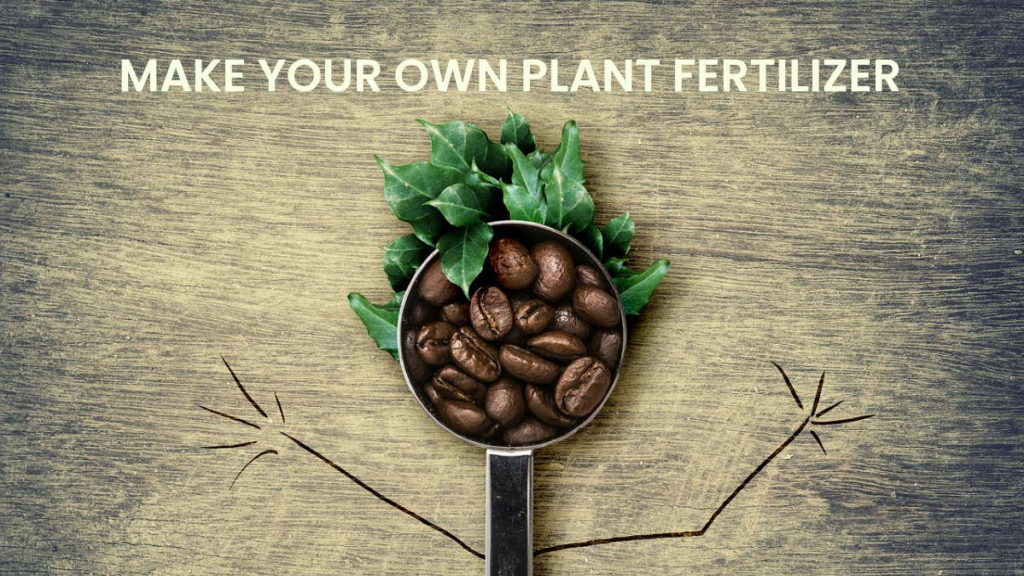Did you know that making your own home-based fertilizer for plants is as easy as making a cup of coffee? Quite Literally.
I myself was quite astonished by this in the beginning. However, after a bit of research, I was excited and could not wait to try it at home.
Now you may have guessed by now that the secret ingredient in creating an all-natural home-based fertilizer for your precious plants is coffee grounds.
So that you can understand the entire process before you go ahead and feed your plants some coffee, we shall cover the following topics today:
- Why Garden Plants or Home Plants Lose Nutrients?
- How Coffee Grounds Help Enrich the Soil?
- How to Make Your Own Fertilizer at Home?
- Important Precautions When Using Coffee Grounds as Fertilizer.
1) Why Garden Plants or Home Plants Lose Nutrients?
Instead of going into the technical details, I am going to give a very simple answer. The reason plants in your home or your garden lose nutrients is that they use up all that is there in the soil over time.
Think of a potted plant. They are relying on the soil in the pot for their nutrients. However, there is a limited supply as the roots have access only to the soil in the pot. As time goes by, the plant starts using up the nutrients, depleting them from the existing soil.
Once the soil has lost the nutrient content, you will see your plants getting weaker with each passing day. They lose their brightness, they feel pale and shed leaves.
This is the reason why you need to replenish the soil of a potted plant either in your house or in your garden with nutrients from a natural fertilizer.
2) How Coffee Grounds Help Enrich the Soil?
Coffee grounds are rich in nitrogen. Apart from this, they do have several other minerals in varying quantities such as potassium, iron, calcium, phosphorus etc.
Many gardeners claim it is not just what coffee grounds add to the soil that is of benefit. What coffee grounds remove from the soil is a huge help as well. There have been reports that coffee grounds can help absorb metal contamination from the soil in a garden.
So considering the nutrients that are being added and the contamination that is being removed, coffee grounds make excellent fertilizers that enrich the soil.
3) How to Make Your Own Fertilizer at Home?
Now, this is the really easy part. At the start of this post, I mentioned making your own home-based all-natural plant fertilizer was as simple as making coffee.
Well, that is it.
Simply go ahead and brew your ideal cup of coffee as usual. However, unlike most other times, do not discard the leftover coffee grounds. Keep them in a separate jar or any kind of container. Wait till they dry and your home-based fertilizer is ready for use.
Just in case you do not make coffee at home, you can easily source coffee grounds from a café. Most cafés would be happy to get rid of their coffee grounds as it is just a waste product for them. Some even neatly pack their coffee grounds and give it to whoever wants them.
4) Important Precautions When Using Coffee Grounds as Fertilizer.
Now while coffee grounds definitely contain a lot of nutrients that enrich the soil and help plants grow, there are a few precautions you must take before using them on your plants.
Ideally use only a little at first to see how your plant reacts.
Remember coffee grounds are ultimately the same as your coffee drink. What this means is that they contain caffeine and are acidic in nature. Not all plants can thrive if the soil suddenly gets a high dose of those two elements.
So my strong advice would be to add little coffee grounds to your soil to check whether there is an adverse effect on your plant. If you see the plant is thriving, then use it regularly to mix with the soil. If you see stunted growth or any other issue, do not use it for that particular plant.
You have to do this individually for all your plants. Do not go spreading coffee grounds all over your garden as that can cause some plants to grow well and others to wither quickly.
Final Takeaway
Coffee grounds contain several nutrients that can help enrich the soil of your garden. They can also help in the removal of metal contamination.
Coffee grounds are also possibly the simplest way of making home-based plant fertilizer. They are environment friendly, do not cost anything extra and are a good example of converting waste into a useful product.
As long as you are taking the precautions as mentioned above, you should be fine. Also just in case, your garden has more plants that prefer acidic soil, then coffee grounds can be the perfect fertilizer for you.


Comments are closed.